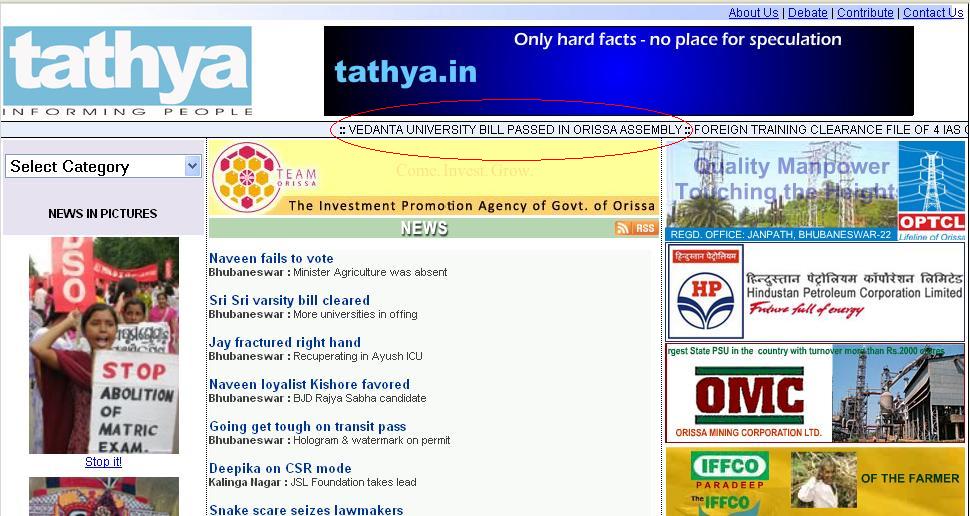Following are some excerpts from a report in Indian Express.
The HRD Ministry has unveiled a blueprint for world-class universities (WCUs) that proposes a free hand and more autonomy to varsities, exempting them from audit systems and placing them outside the UGC-style regulatory system, offering a range of scholarships and a flexible faculty recruitment process. The ministry has also announced its ‘Brain Gain’ policy to attract quality faculty from across the globe proposing to amend existing legislations to permit foreign citizens to be engaged as faculty in India.
The concept note for the universities, circulated to select academicians, proposes a strong focus on research at these varsities and government aid in the form of a corpus.
…The varsity will have just two pay bands for faculty and the varsity will be free to recruit as many faculty members as its suits them within these two pay bands.
… The ministry also announced its ‘Brain Gain’ policy on Monday which aimed at attracting best quality teachers from across the globe to work at the 14 National Universities, proposed to be set up by the Centre in the 11th Plan. To ensure that quality faculty of foreign nationality join these universities, the government may amend the Citizenship Act, 1955 which does not allow persons of Indian origin, who are citizens of another country, to be appointed to public services and posts.
The government also intends to amend the Comptroller and Auditor General’s (Duties, Powers and Conditions of Services) Act of 1971 to exempt national universities from the CAG’s scrutiny.
Following is some excerpts from a zeenews report.
These universities will be kept out of the purview of existing regulatory bodies in higher education in academic matters.
"The government shall ensure that the governance structure of the university shall be tuned to towards ensuring autonomy over all matter, specially academic matters, including but not limited to admissions, curriculum, research, assessment, award of degrees, selection of members of the professoiorate and the basic direction of the academic work in the university," the concept note said.
The autonomy will be at various levels — at the level of university via-a-vis government, at the level of faculty vis-a-vis the university and at the level of researcher via-a-vis the faculty.
These proposed universities will get Research Endowment Fund of an amount less than Rs 200 crore each annually.
Following the preparation of the concept note, the Ministry will make a draft bill on setting up the universities which will go to the cabinet for approval and then placed before Parliament.
The universities will have the freedom to get funding from non-governmental sources subject to condition that it will not be from dubious or unverified sources.
An research peer group, comprising eminent academicians, will evaluate the research proposals. The varsities will have the freedom to decide remuneration for research personnel.
As a major exemption, the transactions of these universities will be kept out of the purview of Comptroller and Auditor General (CAG).
… Accountability will be ensured by the review of the academic research peer group for research work and teachers peer group for course work and teaching.
"To that end, scrutiny and accountability shall be defined by outcomes rather than processes," the note said.
The universities will be free to establish Chairs of Studies with funding through non-government endowments.
Similarly, the universities will have freedom to make appointments by invitation based on the recommendations of a standing search committee.
"Recognising that brilliance is not a factor of age of a person or years spent in research, the appointment by invitation shall not be subject to limitations of age or years of experience of the considered candidate," the concept note said.
August 19th, 2009
Following is from a report in Pioneer.
Finally, the Vedanta University Bill has got the approval of the State Legislative Assembly on Thursday.
With this the authorities would be able to set up a multi-disciplinary varsity on a sprawling 6,000 acre land along the Puri-Konark Marine Drive Road. Chairman of the Knowledge Commission Sam Pitroda is likely to be the first VC of the Vedanta University. Besides, at least three Nobel laureates have been roped in to join as faculty, sources said.
Earlier, the Opposition as well as the Treasury bench members frowned upon some of the provisions made in the Varsity Bill. A number of amendments were brought in the existing provision. The proposed varsity would not be able to open off campus or off shore centre in relation to academic programmes of the institution.
Government chief whip Rabi Narayan Pani and Opposition Chief Whip Prasad Harichandan moved two separate amendments for the consideration of the House. Both opposed the provision allowing the varsity to open off campus centres.
“The legislation passed in the State Assembly has its purview in the territory of Orissa. Therefore, it would be illogical to allow the varsity to open off campus centres,” Harichandan said, adding that the varsity should be allowed to open regional campuses inside the State. Harichandan also cited the instance of a Supreme Court judgment striking down the Chhattishgarh Government’s act of allowing a varsity to open off campus.
“We asked the varsity authorities to open regional campuses inside the State. We have also proposed them certain locations in the KBK region, southern and northern Orissa for opening up of the campuses,” Higher Education Minister Debi Mishra said while replying to the amendments brought by the members.
As per the provision, the employees would not be treated as public servants. However, the Government would not interfere in the selection process of the employees. Merit would be given due consideration at the time of admission as its motto is to develop it as a world-class university. But no reservation facilities would be extended to either Oriya students or SC and ST students. Earlier, there was a demand to extend 10 per cent reservation facilities to the SC and ST and Oriya students. But the demand was struck down.
However, financial relaxations would be provided to SC and ST and weaker sections of the society.
Two MLAs would be taken as the members in the Management Board of the University.
If the University authorities don’t go ahead in establishing the university, the land would ultimately come back to the Government. If there is any dissolution of the university, it has to given a notice to the Government and employees and students of the university at least three year in advance.
Higher Education Minister Mishra also maintained that the university was required for the development of education in the State. He also rejected BJP legislature party leader KV Singh Deo’s apprehension that Vedanta might get benefit from the rich sand minerals. “The Centre is empowered to take a decision if any mineral is available in the land,” he said.
Here are some other reports on the topic: Economic Times, Business Standard, tathya.in.
Following are some excerpts from the Business Standard report.
The admissions to the university will be on merit basis. Though there is no reservation in admission and recruitment for the Orissa students, the university authorities will set up knowledge centres in different regions of the state for development of higher education in these areas.
Similarly, there will be concession in the fee structure for the weaker section, scheduled caste, scheduled tribe students of the state. The governing body of the university will comprise of 16 members. They will include two MLAs, one lady from SC or ST community and two nominated members of the government who includes the higher education secretary and an eminent educationist of the state.
If the university authorities choose to close down the institution, they will have to give notice for it three years in advance. In that case, the land acquired for the university from the local people, government and the Lord Jagannath temple will revert back to the original title holders. The land will be transferred to them at the price at which the land was acquired. It may be noted, the project will require 6000 acres of land.
… Meanwhile, the ICFAI University Bill, which was also tabled in the house, was referred to a select committee of the state assembly.
Following is an excerpt from tathya.in.
More than 40 lawmakers participated in the marathon discussion which covered 20 amendments.
Most important is fee relaxation for the poor, SC ST and meritorious students of the state, for which university authorities will formulate a separate policy, announced Mr.Mishra.
Secondly 2 of the lawmakers of Orissa House will find place in the Board of Governors.
Most importantly, if the University fails to come up, the land losers will receive back their land.
Land losers will also get facility to allow their children to read in the University with a liberal fee.
The amendments seem pretty reasonable.
Moreover, I really applaud the democratic process. The Bill was first presented in December 2008 and was tabled. This time it was presented on Saturday the 25th July 2009. There have been discussion on it since then and several hours on the 29th and almost the full day of July 30th was spent on debating and going over the bill clause by clause and making 20 amendments. I applaud the Orissa lawmakers to have done their job diligently. I admire the whole process. I hope the proceedings was recorded in video and would be some day made available to generation of Orissans and Vedanta University alumni.
July 31st, 2009
Following is from a recent PIB report about a Rajya Sabha reply.
The Government is considering a proposal to set up 14 Universities aiming at world class standards at the following locations:-
|
Sl. No.
|
Location
|
|
1.
|
Amritsar (Punjab)
|
|
2.
|
Greater Noida (Uttar Pradesh)
|
|
3.
|
Jaipur (Rajasthan)
|
|
4.
|
Gandhinagar (Gujarat)
|
|
5.
|
Patna (Bihar)
|
|
6.
|
Guwahati (Assam)
|
|
7.
|
Kolkata (West Bengal)
|
|
8.
|
Bhopal (Madhya Pradesh)
|
|
9.
|
Kochi (Kerala)
|
|
10.
|
Coimbatore (Tamil Nadu)
|
|
11.
|
Mysore (Karnataka)
|
|
12.
|
Pune (Maharashtra)
|
|
13.
|
Vishakhapatnam (Andhra Pradesh)
|
|
14.
|
Bhubhaneshwar (Orissa)
|
Universities aiming at world class standards would act as exemplars for other universities including Central Universities, in benchmarking standards of teaching and research to those prevailing in the best universities in the world.
This information was given by the Minister of State for Human Resource Development Smt. D. Purandeswari, in a written reply to a question, in the Rajya Sabha today.
There are some reports about a "brain gain" policy that is being considered for the National Universities. Following is an excerpt from a report in webindia123.
The brain drain from the country will be checked by a ‘Brain Gain’ policy, the Government told the Rajya Sabha today.
The steps mooted under the policy would attract talent from all over the world into the country’s 14 national universities aiming for world class standards as well as for Indian Institutes of Technology, Indian Institutes of Management and National Institutes of Technology, Minister of State for Human Resource Development D Purundeswari told the House in a written reply.
Following are excerpts from a report in Times of India by Akshaya Mukul.
In a move that could result in the exodus of Indian scholars and teachers from foreign universities back to the country, HRD ministry’s new Brain Gain policy promises unheard of academic freedom, negotiable salaries, massive research funds, right environment, freedom from regulation and bureaucratic control and a good quality of life.
… The ministry’s Brain Gain policy — aimed at attracting Indian talent for 14 proposed national universities to be developed as ‘global centres of innovation’ — is likely to be made public in the coming days.
Recognizing that funding is essential to support research environment, Brain Gain policy promises a Research Endowment Fund of at least Rs 200 crore per national university per year. The university will also have the freedom to source funding from non-government sources subject to their not being dubious organizations.
Grants will be provided to individual researchers on the basis of their proposal, which will be evaluated by ‘academic research peer group’ consisting of eminent academics. Researchers will be free to procure aids and equipment, appoint research associates and assistants and decide on their salary. The amount spent by the university or its academics on research or teaching will not be audited by the Comptroller and Auditor General of India. In this regard, the ministry has proposed amendment to CAG Act, 1971.
Accountability will be ensured by reviews by the academic research peer group for research work and teaching peer group for course work and teaching. National universities will have the freedom to establish chairs of studies with funding through non-government endowments to be occupied by eminent professors. Chair professors will receive pay, if any, both from the endowment as well as university.
On the academic front, national universities will be kept out of the purview of regulatory oversight as well as regulations on maintenance of standards or minimum qualification requirements for appointment to academic posts. As for academic freedom, researchers will be free to publish results. They will also have freedom to patent the results of research jointly with university without getting government approval, except in cases of research in strategic areas.
July 28th, 2009
Tathya.in (see also Pioneer) reports that XIMB (Xavier Institute of Management, Bhubaneswar) is contemplating to become or create a university so as to accommodate its expansion plans.
This is a great idea.
As of now, XIM B is the best ranked higher education institution in Orissa. 2008 Outlook ranking has it at number 8 among the management institutions in India and number 3 among the private management institutes (XLRI is number 1 privatre management school in that list ). The next best ranked institute from Orissa is NIT Rourkela which is often ranked in the early thirties among engineering colleges/institutions. The best it has been ranked is 18.
Besides XIMB, the Xavier brandname is well established in India and abroad. In India, XLRI Jamshedpur is higher ranked than XIMB and is a perennial top 10 among management institutions in India. Similarly, XISS (Xavier Institute of Social Sciences) Ranchi is also well thought off. In USA, there are three Xavier Universities: http://www.xavier.edu/ (Cincinnati), http://www.sxu.edu/ (Chicago), and http://www.xula.edu/ (Louisiana) and are all well regarded.
The Xavier institutions are Jesuit institutions and XIMB was established by the Jesuit Society of India. Besides the Xavier institutes the Jesuit society also established the many well known Loyolla colleges in India. In US, there are about 30 Jesuit universities including famous ones like Georgetown University and Boston College. See http://en.wikipedia.org/wiki/Association_of_Jesuit_Colleges_and_Universities for the list.
With such background and past history of establishing and running quality higher educational institutions, a Xavier University in Orissa, which will be the first such university in India, would be a coup for Orissa and the Orissa government should jump at it, expedite this proposal and provide all necessary support.
In this regard, it may be noted that while the Sri Sri organization have a few higher education institutions, none of them appear in any ranking. In case of Vedanta University, they do not have a past track record. They do have very good people, plans and consulting agencies associated with it and one can imagine that they will be top notch.
But in case of Xavier there is no need of any imagination. With XIMB and XLRI they have proven themselves in India and with the Xavier Universities in the US and with Gerorgetwon University they have proven themselves internationally. So this is a great opprtunity for Orissa, which it should not let slip out. Also, it should expedite the process so that the first Xavier University in India is in Orissa. XLRI has contemplated becoming a deemed university. Xavier University in Orissa should be established before that happens. The one that is first has a first-mover’s advantage and that advantage should not be squandered away.
July 25th, 2009
Various reports (Economic Times,PTI) mention that Orissa government has introduced bills for three private universities. They are: Vedanta University, Sri Sri University and ICFAI University.
In this context it should be noted that the UGC currently (as of June 2009) recognizes 42 such private state universities in India. None of them are in Orissa. This list of 42 universities obtained from the UGC site http://www.ugc.ac.in/notices/updatedpriuniver.pdf is as follows:
CHHATTISGARH
1. Dr. C.V. Raman University, Kargi Road, Kota, Bilaspur.
2. MATS University, Arang Kharora Highway, Gram Panchayat: Gullu, Village: Gullu, Tehsil : Arang, District: Raipur.
GUJARAT
3. Dhirubhai Ambani Institute of Information and Communication Technology, Gandhinagar, Post Box No. 4, Gandhinagar-382 007.
4. Ganpat University, Ganpat Vidyanagar, Mehsana, Goazaria Highway, District Mehsana – 382 711
5. Kadi Sarva Vishwavidyalaya, Sarva Vidyalaya Campus, Sector 15/23, Gandhinagar.
6. Nirma University of Science & Technology, Sarkhej, Gandhinagar Highway, Village- Chharodi, Ahmedabad.
7. Pandit Deendayal Petroleum University, At Raisan, Dist. Gandhinagar – 382 009.
HIMACHAL PRADESH
8. Chitkara University, HIMUDA Education Hub, Kallujhanda (Barotiwala), Distt. Solan, – 174103 Himachal Pradesh
9. Jaypee University of Information Technology, District-Solan-173 215.
MEGHALYA
10. Martin Luther Christian University, KIPA Conference Centre, Central Ward, Shillong – 793 001.
11. Techno Global University, Anita Mension Bishnupur, Lawsohtun Road, Shillong – 793004.
MIZORAM
12. The Institute of Chartered Financial Analysts of India University, Salem Veng, Chaltlang, Aizawal – 798 012.
NAGALAND
13. The Global Open University, Wokha – 797 111.
PUNJAB
14. Lovely Professional University, Jalandhar –Ludhiana, G. T. Road, Near Chehru Railway Bridge, Phagwara, District – Kapurthala – 144 002.
RAJASTHAN
15. Bhagwant University, Post Box No. 87, Sikar Road, Ajmer – 305 001.
16. Jagannath University, Village-Rampura, Tehsil-Chaksu, Jaipur.
17. Jaipur National University, Jagatpura, Jaipur.
18. Jyoti Vidyapeeth Women’s University, Vedant Gyan Valley Village, Jharna Matpala Jabner, Link Road NH-8, Jaipur.
19. Mewar University, Chittorgarh.
20. NIMS University, Shobha Nagar, Jaipur – 303 001.
21. Sir Padmapat Singhania University, Pacheribari, Jhunjhunu.
22. Singhania University, Pacheribari, Jhunjunu.
23. Suresh Gyan Vihar University, Mahal Jagatpura, Jaipur.
24. Jodhpur National University, Narnadi Jhanwar Road , Jodhpur -342001 ,Rajasthan.
25. Amity University, Rajasthan NH-11C,Kant Kalwar, Jaipur- 303002
SIKKIM
26. Eastern Institute for Integrated Learning in Management University, Jorethang.
27. Sikkim- Manipal University of Health, Medical & Technological Sciences, Gangtok-737 101.
TRIPURA
28. Institute of Chartered Financial Analysts of India (ICFAI), Agartala – 799001.
UTTAR PRADESH
29. Amity University, NOIDA, (UP)
30. Integral University, Kursi Road, Lucknow-226 026.
31. Jagadguru Rambhadracharya Handicapped University, Chitrakoot Dham-210 204.
32. Mangalayatan University, Aligarh.
33. Mohammad Ali Jauhar University, Rampur.
34. Sharda University, Gautam Budh Nagar, U.P.
35. Swami Vivekanand Subharti University, Delhi-Haridwar Byepass Road, Meerut.
36. Teerthanker Mahaveer Univesity, Delhi Road, Moradabad.
UTTRAKHAND
37. Dev Sanskrit Vishwavidyalaya, Gayatrikunj, Shantikunj, Hardwar-249 411.
38. Doon University, Campus Office, 388/2, Indira Nagar, Dehradoon.
39. Himgiri Nabh Vishwavidyalaya (University in the Sky), Dehradun.
40. Institute of Chartered Financial Analysts of India (ICFAI), C-1/103, Indira Nagar, Dehradun-248 006.
41. University of Petroleum and Energy Studies, Building No. 7, Street No. 1, Vasant Vihar Enclave, Dehradun-284 006.
42. University of Patanjali, Patanjali Yogpeeth, Haridwar.
In that document, after giving the list, the notice says the following:
These universities are competent to award degrees as specified by UGC under Section 22 of the UGC Act and with the approval of the statutory councils, wherever required through their main campus. Wherever the approval of the statutory council is not a pre-requisite to start a programme, the universities are required to maintain the minimum standards regarding academic and physical infrastructure as laid down by the concerned statutory council.
It is also informed that private universities cannot affiliate an institution/college. They cannot establish off campus centre(s) beyond the territorial jurisdiction of the concerned State. However, they can establish off-campus centre(s) within the concerned State after their existence of five years and with the prior approval of the University Grants Commission. So far, UGC has not approved any off campus centre(s) of any Private University.
Approval letters for course under distance mode should clearly state that the course has been approved by the Joint Committee UGC, AICTE and DEC and the approval letter should be jointly signed by Secretary UGC , Member Secretary, AICTE and Director, DEC as per the provision laid down under clause 9 of the MOU signed by UGC, AICTE and DEC.
Students/Public at large are advised to go through this website carefully before taking admission in any of the above State Private Universities and report the matter to Secretary, UGC on finding any violation of the above provisions.
Interestingly, none of the above are in the southern states (Andhra Pradesh, Tamil Nadu, Karnataka and Kerala) or Maharastra which took a huge lead in establishing engineering colleges.
July 25th, 2009



